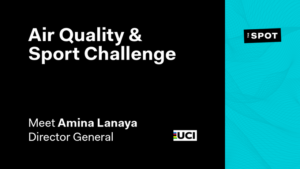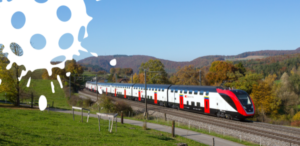
Meet the UCI, official supporter of the Air Quality & Sport Challenge
The Union Cycliste Internationale (UCI), the world governing body for the sport of cycling bringing together 201 National Federations, is an official supporter of the […]



Swiss railways SBB becomes a partner of the WFC 2022
Compared to private transport, traveling by public transport in Switzerland is not only stress-free, but also good for the environment and thus in line […]


The Federation Internationale de l'Automobile (FIA) has introduced a practical guidebook which provides guidance and support to FIA stakeholders and members to increase their sustainability performance in delivering events.
The “FIA Introductory Guide for Sustainable Events” has been designed to provide event organisers with the technical support and guidance to identify simple and clear actions for improving their sustainability performance. The focus is on small actions that can lead to significant changes allowing for a practical approach that can be applied to events of all sizes.
The guidelines are also in close alignment with the requirements of the FIA’s Environmental Accreditation Programme.
The application of the guidelines is meant to lead the user to achieve a two-star level, the second of a three-tiered accreditation system.The guidelines are structured around six key impact areas:
- Energy use. Including identifying the sources, measuring use and targeting.
- Air Quality & Transport. Commonly considered the main source of emissions, the attention is centered on reductions and efficiency.
- Waste Management. Focusing on reducing, reusing and recycle in order to build a successful waste management plan.
- Water & Biodiversity. Providing access to fresh drinking water to participants and preventing any potential harm or disruption to natural habitats while protecting and educating on its importance.
- Supply Chain. By recognising the power over the supply chain, organisers can align with suppliers and sponsors that follow the sustainable vision of the event.
- Social Responsibility. Driving social and economic benefit to local and regional communities, involving its people, businesses and authorities.
BENEFITS
- The creation of guidelines for sustainable events can serve both externally and internally, guiding the organisation of all types of events in a more sustainable way.
- Having a guide for sustainable events can serve as an entry point for more advanced programs, such as the FIA Accreditation programme, driving both awareness and practical action points.
- FIA can share the environmental awareness in a user-friendly way which helps the FIA to fulfil its required goals and environmental targets.
Click here to download the case study








Solihull becomes first location of Severn Trent and Birmingham 2022 Commonwealth Forests
Solihull has become the first location to have trees as part of the initiative of Severn Trent and Birmingham 2022 Commonwealth Games to create […]



Facing the effects of climate change, skiers want to save their snow — and their sport
There are few places where climate change is as tangible as in the Alps; Europe’s largest mountain range has been warming at twice the […]


Oman Athletic Association Joins Global Framework To Combat Climate Change
The Oman Athletic Association (OAA) have joined World Athletics as a signatory of the United Nations Climate Change Sports for Climate Action Framework, underscoring […]


Sustainability: How Albert is expanding its reach
Over a decade on from when it founded the albert sustainability project (now run by Bafta) the BBC announced recently that all of its […]


EuropeActive joins fourth meeting of the European Commission Expert Group on “Green Sport”
EuropeActive participated in the European Commission Expert Group on Green Sport, which is composed of representatives of the European sport movement and EU Member […]


Turning carbon emissions into running shoes
Announcing CleanCloud™ – a new high-performance foam for running shoes, created using carbon emissions as a raw material. On is leading a supply chain […]


Lifting the Lid on Boat Build Impacts for a more Sustainable Industry
Only by prioritizing sustainability along with performance, can the marine industry take urgent action to fight climate change. What these actions could look like are explored in the Design & Build report our team has published following the construction of the new race boat Mālama.
Following the official launch in September 2021 of Mālama, the latest high-performance IMOCA race boat, 11th Hour Racing Team has published a comprehensive design and build report in both English and French.
Sharing detailed insights into the boat’s construction, material components, supply chain, and environmental impact, the report aims to drive positive action within the marine industry and provide a roadmap for aligning with international frameworks for positive climate action, including the UNFCCC (United Nations Framework on Climate Change) and the Paris Agreement.
Damian Foxall, Sustainability Manager at 11th Hour Racing Team, explains how the Team has used the boat build as an example of how sustainable innovation could be implemented across the wider industry: “Over the past ten years, there has been amazing progress in on-water performance in our class, but this has come at a high price. Since 2010, the footprint of an IMOCA has increased by nearly two-thirds from 340 to 550 tons in greenhouse gas emissions. This is an overall trend we see in pretty much any industry, driven by performance we have accelerated too fast in the wrong direction, and are only just waking up to reality.”
Referencing the Paris Agreement as a global target for energy savings, Foxall continues: “The need to reduce our emissions in the marine industry is urgent – 50% by 2030, and that’s just eight years away. We are far away from that right now.”
In order to get back on track and reduce emissions, it is crucial to understand where exactly the emissions are coming from. This is often easier said than done, as Amy Munro, Sustainability Officer at 11th Hour Racing Team, explained: “Building a race boat is a complex process involving a huge number of stakeholders and components. You need to break it down in detail to fully understand what are the major impacts. This is why we have meticulously measured the impact of every step in the design and build process of our new boat and conducted a life cycle analysis (LCA) that helps to uncover underlying issues. This way we were able to address the issues during the build and find opportunities and solutions to make the shift.”
Click here to download the full report